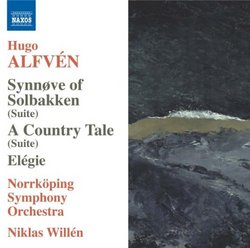| All Artists: Hugo Alfven, Niklas Willen, Norrköping Symphony Orchestra Title: Hugo Alfv�n: Synn�ve of Solbakken; A Country Tale; El�gie Members Wishing: 0 Total Copies: 0 Label: Naxos Original Release Date: 1/1/2007 Re-Release Date: 5/29/2007 Genre: Classical Style: Symphonies Number of Discs: 1 SwapaCD Credits: 1 UPC: 747313282821 |
Search - Hugo Alfven, Niklas Willen, Norrköping Symphony Orchestra :: Hugo Alfv�n: Synn�ve of Solbakken; A Country Tale; El�gie
 | Hugo Alfven, Niklas Willen, Norrköping Symphony Orchestra Hugo Alfv�n: Synn�ve of Solbakken; A Country Tale; El�gie Genre: Classical |
Larger Image |
CD Details |
CD ReviewsGorgeous Swedish Film Music by a Swedish Romantic Master, Hu J Scott Morrison | Middlebury VT, USA | 06/03/2007 (5 out of 5 stars) "I think I must have some Swedish blood because I almost invariably respond positively to music by Swedish composers. One of my favorites among them is Hugo Alfvén (1872-1960) who is primarily known outside Sweden for his so-called 'Swedish Rhapsody' (actually it's the first of three such rhapsodies and is more properly known by its subtitle 'Midsummer Vigil'). I have been following with great pleasure the release of the Alfvén symphonies on the Naxos label and now we have a CD that contains, for the most part, music he wrote for Swedish films.
The first of these is a suite made from the music he wrote for 'Synnøve Solbakken', a 1934 film taken from the novel of the same name by the great Swedish writer Bjørnstjerne Bjørnson. It is about the gentle Synnøve and her love for Torbjörn who has been paralyzed by a fight with a family rival. When he sees his father trapped in a cart accident he suddenly regains his ability to walk and thus save his father. Alfvén's music uses Norwegian folk-tunes and in general the tone of the entire suite is one of longing, gentleness, poignancy, occasionally enlivened by folk-dances. This almost half-hour suite is filled with lovely melodies and suave orchestration played by the Norrköping Symphony under Niklas Willén, a conductor who appears to making a specialty of Alfvén's music. The second film suite, taken from music for 'Mans kvinna' (literally, 'Man's Woman') but better known by its alternate title 'En Bygdesaga' ('A Country Tale'), is altogether more dramatic in nature. The film is about a woman, Märit, unhappily married to a farmer, Påvel, and in love with a younger farmer, Håkan. When the husband learns, via their maid, of his wife's longing, he puts her under lock and key under the pretext that she is his 'property.' She eventually gets free and elopes with her lover. Although the music is quality Alfvén, the film was not a success and the suite itself has been less popular than that from 'Synnøve Solbakken.' In my judgment, however, it is a stronger work and I found myself transfixed throughout its entire 33 minute length, particularly by Alfvén's depiction of both longing and jealousy. The CD is filled out by 'Elégie (vid Emil Sjögrens bår)' ('Elegy, at Emil Sjögren's Funeral'), a twelve-minute tribute to Sjögren, Alfvén's older colleague, a composer and organist of local note. The music is a slow, treading, euphonious piece in which a grief-stricken chorale is briefly interrupted by a lyrical consolatory second theme which then transforms the grief of the first theme into a benediction. This issue is another triumph in this continuing series and I strongly recommend it, although for those coming to Alfvén's music for the first time I would probably suggest they start with one of the performances of some of the symphonies. I would suggest Alfvén: Symphony No. 5; Andante religioso or Alfvén: Symphony No. 4 "From the Outermost Skerries". Of course, for those who don't already know the 'Swedish Rhapsody' I recommend Alfvén: Orchestral Works, Vol.1 Scott Morrison" |
